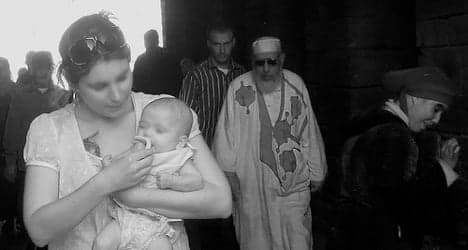Spanish mums 'trapped' by Moroccan baby ban

Fifty Spanish families who adopted Moroccan babies a year and a half ago are not being allowed to take the children back home with them to Spain.
Monica Díaz first met her adopted son Abdallatif in an orphanage in Rabat when he was not even a month old.
Nearly two years on, new adoption laws in Morocco mean she hasn't been able to take him back home with her to the Spanish region of Catalonia.
"They've asked us to be patient, but it’s been nearly 22 months of suffering," she told Catalan daily La Vanguardia.
Monica, who is self-employed and used to pay Abdallatif regular visits in the early stages of the adoption, has now had to move to Rabat to ensure her son is not taken away from her.
Along with 50 other families, she is waiting for a signature on her son’s passport which will allow him to leave Morocco.
What was once a relatively straight-forward adoption procedure has been hindered by a change of government in the North African country.
Abdelilah Benkirane's moderate Islamist Justice and Development Party, which has ruled since late 2011, introduced a new law which prevents non-residents from adopting Moroccan children.
"They don’t want to sign my son’s leaving permit," Maribel, a Basque woman who shares a flat with Mónica in Rabat, told La Vanguardia.
The more than 20 Spanish families living in Rabat who find themselves in the same “desperate situation” are in regular talks with the Spanish Embassy in Morocco to ensure the new law isn't applied retroactively.
"We're not going to abandon our children, as desperate as we may be," Maribel explains.
Adoptions in Morocco take the form of Kafala, by which the adoptive parent is seen more as a guardian and children keep their Muslim names to guarantee they don't forget their roots or religion.
In most cases Kafala is restricted to Muslims or converts to Islam.
Comments
See Also
Monica Díaz first met her adopted son Abdallatif in an orphanage in Rabat when he was not even a month old.
Nearly two years on, new adoption laws in Morocco mean she hasn't been able to take him back home with her to the Spanish region of Catalonia.
"They've asked us to be patient, but it’s been nearly 22 months of suffering," she told Catalan daily La Vanguardia.
Monica, who is self-employed and used to pay Abdallatif regular visits in the early stages of the adoption, has now had to move to Rabat to ensure her son is not taken away from her.
Along with 50 other families, she is waiting for a signature on her son’s passport which will allow him to leave Morocco.
What was once a relatively straight-forward adoption procedure has been hindered by a change of government in the North African country.
Abdelilah Benkirane's moderate Islamist Justice and Development Party, which has ruled since late 2011, introduced a new law which prevents non-residents from adopting Moroccan children.
"They don’t want to sign my son’s leaving permit," Maribel, a Basque woman who shares a flat with Mónica in Rabat, told La Vanguardia.
The more than 20 Spanish families living in Rabat who find themselves in the same “desperate situation” are in regular talks with the Spanish Embassy in Morocco to ensure the new law isn't applied retroactively.
"We're not going to abandon our children, as desperate as we may be," Maribel explains.
Adoptions in Morocco take the form of Kafala, by which the adoptive parent is seen more as a guardian and children keep their Muslim names to guarantee they don't forget their roots or religion.
In most cases Kafala is restricted to Muslims or converts to Islam.
Join the conversation in our comments section below. Share your own views and experience and if you have a question or suggestion for our journalists then email us at [email protected].
Please keep comments civil, constructive and on topic – and make sure to read our terms of use before getting involved.
Please log in here to leave a comment.